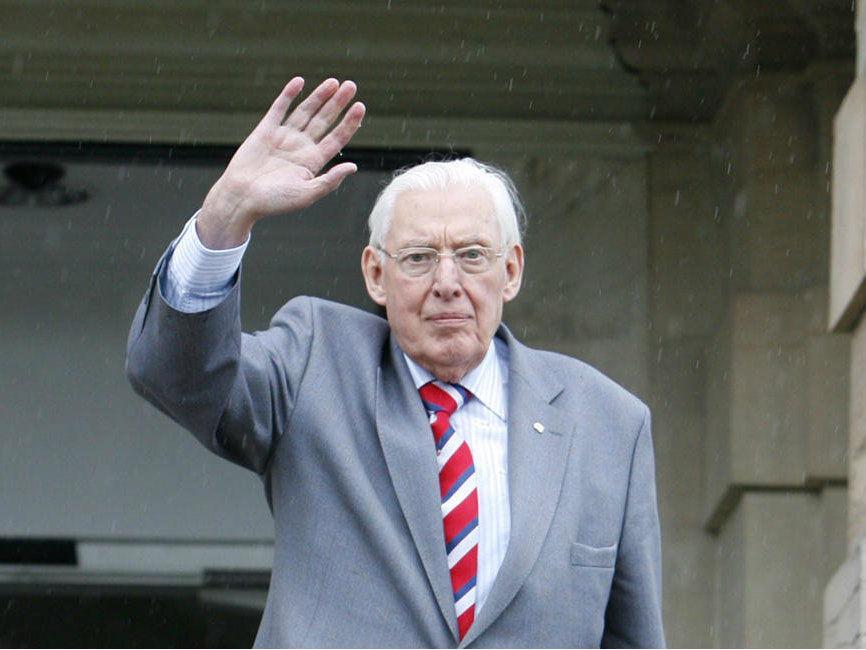
Ulster unionist and Protestant minister Ian Paisley died Friday in Belfast, Northern Ireland. A polarizing political figure, Paisley’s death affords partisans of all “colors” the opportunity to absorb and define his legacy. With sectarian violence again engulfing the Middle East and Africa, however, Paisley’s life reminds us that the West is not as far removed from religious bigotry as we would like to believe.
Writing at Breitbart London, Andrew Mckie offers a paean to Paisley arguing that he “defended ordinary people who wanted only respect for their religious traditions and to remain part of the UK – something confirmed at every election, but ignored by the bombers and murderers – should be remembered as a remarkable politician who spoke out for his country.”
Mckie’s sentence overflows with his own bias and polite animus. Where a desire for religious tolerance existed among Ulster protestants, Paisley channeled it into religious hatred and bigotry against Catholics. He famously called Pope John Paul II the “anti-Christ,” but his hatred permeated even more pedestrian encounters. Once confronting a local Catholic priest who objected to Paisley’s use of a public building for anti-Catholic meetings, Paisley thundered:
‘Priest Murphy, speak for your own bloodthirsty, persecuting, intolerant, blaspheming, politic-religious papacy, but do not dare to pretend to be the spokesman of free Ulster men . . . Go back to your priestly intolerance, back to your blasphemous Masses, back to your beads, holy water, holy smoke and stinks and remember . . we know your church to be the mother of harlots and the abominations of the Earth.’
Paisley’s strident anti-Catholicism even alienated him from Protestant and Unionist allies. He formed his own breakaway “Free Presbyterian Church” in large part because the existing congregation with insufficiently anti-Catholic. He labeled the Unionist Party Leader a “Judas Iscariot” for negotiating with the Republic and Ireland and cursed Prime Minister Margaret Thatcher as a “Jezebel.”
Paisley did not just confine his beliefs to fiery rhetoric from his religious pulpit. He was instrumental in creating armed Protestant vigilante and paramilitary groups, ostensibly to “defend” Protestants from Catholics. These armed gangs disrupted Catholic marches against religious discrimination and were responsible for the blood of both Catholics and Protestants.
One wonders, in fact, whether Paisley wasn’t as much giving voice to ordinary Protestant views, but capitalizing on legitimate concerns and twisting them to his own political ends. A Protestant acquaintance once noted that, “he would only attract 12 people to his meetings at the town hall. It’s only since he went into politics that he got his following.”
Mckie, and many others, make very much out of Paisley’s late-in-life embrace of the peace process in Northern Ireland and his subsequent role in a kind of “unity government” in the province. It says a great deal about Paisley, however, that an ordained reverend’s acceptance of a peaceful settlement is noteworthy. One would hope that a minister would always prefer peace over violence or dialogue over discrimination. That one can’t is evidence of the poison of sectarian beliefs.
Paisley’s conversion to the peace process may have been political rather than religious, though. He campaigned aggressively against the “Good Friday” peace accords that finally ended the “troubles” in Northern Ireland. Despite his campaigning, 70% voters in Northern Ireland approved the agreement. A desire for peace outweighed centuries-old religious disagreements.
Paisley’s passing may finally retire the ghost of Cromwell in Ireland and Britain. Western civilization has been a long march against the violence and misery arising from sectarian disputes. Our own history shows how fragile this civilization is and how quickly intolerant hatred can seep through its cracks. One ugly chapter of this history is now closed. May it never be opened again.

COMMENTS
Please let us know if you're having issues with commenting.